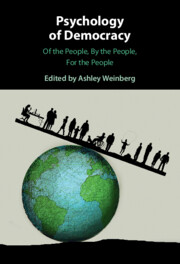Book contents
- Psychology of Democracy
- Psychology of Democracy
- Copyright page
- Contents
- Figures
- Tables
- Contributors
- Preface
- Acknowledgements
- Chapter 1 Psychology of Democracy
- Part I Of the People
- Part II By the People
- Part III For the People
- Chapter 14 Democracy as a Moral Challenge
- Chapter 15 ‘Can I Trust My Future?’
- Chapter 16 Religious Identity Politics and Genuine Support for Democracy
- Chapter 17 Psychology, Democracy and the Media
- Chapter 18 A Social Psychological Approach to Understanding China’s Democratisation
- Chapter 19 The Psychology of Radicalised Conceptions of Democracy
- Index
- References
Chapter 14 - Democracy as a Moral Challenge
from Part III - For the People
Published online by Cambridge University Press: 24 February 2022
- Psychology of Democracy
- Psychology of Democracy
- Copyright page
- Contents
- Figures
- Tables
- Contributors
- Preface
- Acknowledgements
- Chapter 1 Psychology of Democracy
- Part I Of the People
- Part II By the People
- Part III For the People
- Chapter 14 Democracy as a Moral Challenge
- Chapter 15 ‘Can I Trust My Future?’
- Chapter 16 Religious Identity Politics and Genuine Support for Democracy
- Chapter 17 Psychology, Democracy and the Media
- Chapter 18 A Social Psychological Approach to Understanding China’s Democratisation
- Chapter 19 The Psychology of Radicalised Conceptions of Democracy
- Index
- References
Summary
Democracy’s realisation depends upon citizens’ aspirations and capacities to sustain forms of self-governance that promote the expression of their personalities and the full actualisation of their potentials. The development of citizens’ personalities and of democracy are in fact mutually interdependent. Whereas citizens’ world views, reasoning, values, aspirations and habits are crucial to sustain the functioning of democratic institutions, the latter set the conditions for nurturing beliefs, motivations and behaviours that accord with their optimal development and with the pursuit of the common good. This makes democracy a challenge that cannot be successfully achieved unless grounded on the moral commitment of all citizens to treat each other with the same respect as each would like to be treated and to care for one another’s wellbeing as one might care for one’s own growth and happiness. Democracy is destined to fail unless the moral agency of citizens operates as a moderator of the new iniquities carried by modernity.
- Type
- Chapter
- Information
- Psychology of DemocracyOf the People, By the People, For the People, pp. 307 - 331Publisher: Cambridge University PressPrint publication year: 2022
References
- 1
- Cited by

